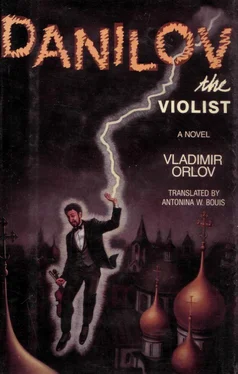Days passed. Danilov was not disturbed. Now he would have been happy to see Valentin Sergeyevich. Danilov would have demeaned himself, and asked if there was any word on when he was to vanish. But Ugrael, the demon from the Arabian deserts, ran into Danilov frequently. Now Ugrael did not wear his burnoose and Danilov could see him clearly. His face was astonishing. All its parts -- nose, eyes, ears, and so on -- existed independently and could change places. Ugrael eagerly spoke about Moscow, but Danilov did not encourage such conversations. Sometimes he even spoke insolently to Ugrael, but the latter did not notice.
Danilov felt insolent now. He wanted to protest. He wanted to do something so outrageous that it would drive his investigators into a frenzy. Then they would get a move on. But Danilov did not know how to create such a scandal. Suddenly he had an idea: "Why not fly off somewhere?"
Constantly looking over his shoulder, Danilov walked through the Fourth Layer right up to the crystal wall. No, no one was running after him. Danilov opened the crystal door and stepped out of the Nine Layers. He flung out his arms and flew. He flew near stars and planets, and enjoyed the view and the joy of soaring. He felt good. Danilov recalled that three and a half centuries ago Kepler thought that there was a music of the spheres. He even expressed it in musical notation. Danilov decided to agree with Kepler for the time being. He had agreed with him periodically in the past. Because of the music. Now Danilov dunked himself in Kepler's version of the world, and the heavenly bodies resounded as he flew past.
Danilov liked listening to the music of the planets of the solar system. He already knew well the melodies of each, knew their voices. He was particularly moved by Mars. It did not sound with the roar of military horns. On the contrary, it was a tender, light-blue voice. In truth, Danilov did not like all the melodies. But, trying to be objective, he told himself that he might have missed something on first hearing and that he should listen to them all again. Perhaps then he would come to accept and love them all. And he recalled that this soaring in the universe might not be repeated. Immediately the melodies of the planets and stars began to sound sorrowful and even tragic. The universe seemed to bid him farewell. "Nonsense!" Danilov said severely. "They change melodies rarely, and then only when there are cataclysms. They wouldn't start to sound different just because some viola player was flying past. I've got to listen to their music as it really is, since I've been given this opportunity, and not make anything up."
A young star sang triumphantly in a molten voice. A herd of meteors sounded like a xylophone and veered off. An orange planet, feeling sorry for itself, sounded like a rusty anchor chain. A small planet whirled by, reminding Danilov of a tarantella rhythm. There were also sounds that Danilov was hearing for the first time. "What voices!" thought Danilov. "What sounds!"
He flew into a small solar system whose star resembled the sun. It had five living planets. He thought: "Why not rest here?" He selected a spot that seemed good acoustically and lay down in a comfortable position, with his arms behind his back. He shut his eyes, and listened. A sextet seemed to be playing just for him. Naturally, not the one with which Danilov gave performances. There was nothing earthly about this sextet. Yet there was something ... the voice of the star sounded brighter and stronger than the others' -- it had a feeling of superiority and even power over them, and yet did not separate itself from the others. Each planet sang its own melody, and each also carried (in its own way) the theme of the star. They conveyed (or so it seemed to Danilov) a proud unity of six heavenly bodies: "We are one! We are one in the universe!" As Danilov grew accustomed to this local music, he liked it more and more. "What's that?" Danilov said in surprise. The voice of the third planet from the star ("stand number four") suddenly changed and, as one of its components, came the sounds of the viola. Yes, the viola! Danilov could not be mistaken. Now the music moved him even more.
"Oh, if only this could go on for eternity..."
Danilov came to his senses. "What am I lying around for? They'll miss me any second!" But why be afraid? That's just what he wanted -- for them to miss him. He should just stay here, listening to the music. But impatience drove him on. "To Taurus!" Danilov commanded.
Now he did not fly, he transported himself. With such zeal that he almost crashed into the planet, where, according to Danilov's information, his father lived. Danilov dispensed with Kepler's version of the universe and he could not hear the planet's melody. It was not only soundless but also lifeless. Everything was covered with yellow dust. The sky above was yellow, and in spots, brown. Danilov looked around the planet and discovered a chain of not-too-high mountains, unfortunately also yellow-brown. He did not see a single hut or tent. Well, well... he shook his head.
The information about his father could have been false. But what if it weren't? How should he look for him? Where? And why? Why had he zoomed off here so impulsively? It was one thing to annoy the investigators and create a scandal. But what was he going to do here? What did his father need with him? What did he need with his father? Who was his father? He had never seen him, did not know him, never felt he even had a father, even though he had wanted one in his childhood. What could he say to him now? "Hello, old man, I'm your son" -- that sort of thing? "What nonsense!" Danilov said, angry with himself. And yet he knew he could not leave right away. He had to try to see his father, if even from a distance. At first he explained this desire as simple curiosity. Then he thought it had to be something more ... what exactly, he did not know.
"How does he live in this dust, and where? How will I find him? Should I just call out, 'Yoo-hoo!'? That's silly. And another thing: Just because I have a need, however vague, to see him doesn't mean that he has a need to see me. Why should I force myself on him?"
Then he thought: What if his father had wanted to see him all these years but had never had the opportunity? Why deprive him of the opportunity now? Would he even know that he was his son? Danilov flew over the planet but could not discover any signs of life. "There's no one here," Danilov decided.
He was tired. He sat down on a cliff, on the rocks.
Suddenly, below in the valley, there was a movement.
Something yellow (dust? liquid? a mass?) boiled up. It rose in a column, turbulent and ferocious, and flew off. Everywhere there were yellow whirlwinds, the mountains trembled, the whole planet seemed about to turn into a dust storm. But the mountains did not crumble, the planet did not change course. Thick wild dust clouds scurried near the cliffs where Danilov sat. "How can there be wind in this atmosphere?" thought Danilov. "It must be he thinks I'm an enemy. Or an insignificant and random violator of his peace. Or perhaps he only exists in the form of dust clouds and cannot show himself to me in any other form."
This last supposition of Danilov's turned out to be erroneous: Very soon in one of the clouds diere appeared the figure of a flying old man, in a furiously flowing white chiton. His lips were pursed, as if he wanted to blow down everything in his path. His straight gray hair waved wonderfully in the air currents.
Danilov rose. He was agitated. He wanted to call out, but he could not even whisper. The old man noticed him and turned in his direction. He flew over to Danilov and stopped abruptly. Danilov was ready to say with a groan "Father!" and throw himself at the old man. But his father held him with his gaze, not allowing him to make a single move. Then he threw up his hands in a nervous gesture, recoiled from Danilov, and flew off.
Читать дальше












